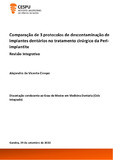| dc.contributor.advisor | Salazar, Filomena Da Glória Barros Alves | |
| dc.contributor.author | Crespo, Alejandro de Vicente | |
| dc.date.accessioned | 2023-03-28T10:21:04Z | |
| dc.date.available | 2023-03-28T10:21:04Z | |
| dc.date.issued | 2022 | |
| dc.identifier.uri | http://hdl.handle.net/20.500.11816/4235 | |
| dc.description.abstract | Introdução: A peri-implantite é uma condição patológica que afeta os tecidos
adjacentes aos implantes dentários caraterizada por inflamação e perda óssea
progressiva. A prevalência desta patologia pode afetar até 18,8% dos sujeitos
portadores de implantes. Por conseguinte, no tratamento cirúrgico da peri-implantite é
primordial fornecer uma técnica de descontaminação da superfície do implante efetiva
e previsível.
Objetivo: Descrever e avaliar a eficácia de 3 técnicas de descontaminação de
implantes durante o tratamento cirúrgico da peri-implantite: laser, sistemas de pó
abrasivos e descontaminação eletrolítica, e esclarecer acerca da superioridade de
alguma abordagem relativamente a outra.
Metodología: Realizou-se uma pesquisa bibliográfica na plataforma PubMed
mediante um algoritmo de busca “booleano” com as seguintes palavras-chave: Periimplantitis [Mesh], surgical treatment, air polishing, air abrasive, erythritol, glycine,
erythritol powder, air-flow, laser, YAG, electrolytic cleaning, peri implantitis e dental
implant. Critérios de inclusão e exclusão foram definidos.
Resultados: 49 artigos foram identificados e, após a aplicação dos critérios de
elegibilidade, 18 estudos foram incluídos.
Conclusões: As três técnicas avaliadas mostraram-se eficazes diminuindo os
valores dos índices periodontais e de progressão da perda óssea, mas restabelecer a
estabilidade dos tecidos peri-implantares é difícil e pouco previsível. Nenhuma técnica
demonstrou superioridade em ensaios clínicos randomizados. Serão necessários mais
estudos para determinar uma técnica que ofereça resultados previsíveis no
restabelecimento da saúde peri-implantar | pt_PT |
| dc.description.abstract | Introduction: Peri-implantitis is a pathologic condition that takes place in the
surrounding tissues of dental implants, characterized by inflammation and progressive
bone loss. The prevalence of this pathology can reach up to 18,8% of patients carrying
dental implants. It is important to provide clinicians a predictable and effective
decontamination protocol during the surgical approach.
Objective: Describe and evaluate the efficacy of 3 different decontamination
protocols during the peri-implantitis surgical approach and, if possible, identify the best
between: laser, air polishing and electrolytic cleaning.
Materials and methods: A bibliographic search was carried out on the PubMed
platform using the combination of the following key-words: Peri-implantitis [Mesh],
surgical treatment, air polishing, air abrasive, erythritol, glycine, erythritol powder, airflow, laser, YAG, electrolytic cleaning, peri implantitis e dental implant. Inclusion and
exclusion criteria were defined
Results: The search identified 49 studies, of which 18 were studied after eligibility
requirement selection.
Conclusion: All 3 decontamination protocols showed to be effective by means of
periodontal index and progressive bone loss reduction, but reestablish peri-implant
health is difficult and unpredictable. None of the techniques showed to be superior in
randomized clinical trials. More studies are needed in order to stablish an efficient and
predictable approach for reestablishing peri-implant health. | pt_PT |
| dc.language.iso | por | pt_PT |
| dc.rights | info:eu-repo/semantics/openAccess | pt_PT |
| dc.subject | Peri-implantite | pt_PT |
| dc.subject | Técnicas de descontaminação | pt_PT |
| dc.subject | Laser | pt_PT |
| dc.subject | Aero-polimento | pt_PT |
| dc.subject | Limpeza eletrolítica | pt_PT |
| dc.title | Comparação de 3 protocolos de descontaminação de implantes dentários no tratamento cirúrgico da Periimplantite Revisão Integrativa | pt_PT |
| dc.type | info:eu-repo/semantics/masterThesis | pt_PT |
| dc.identifier.tid | 203121309 | pt_PT |
| thesis.degree.name | Mestrado em Medicina Dentária | pt_PT |

